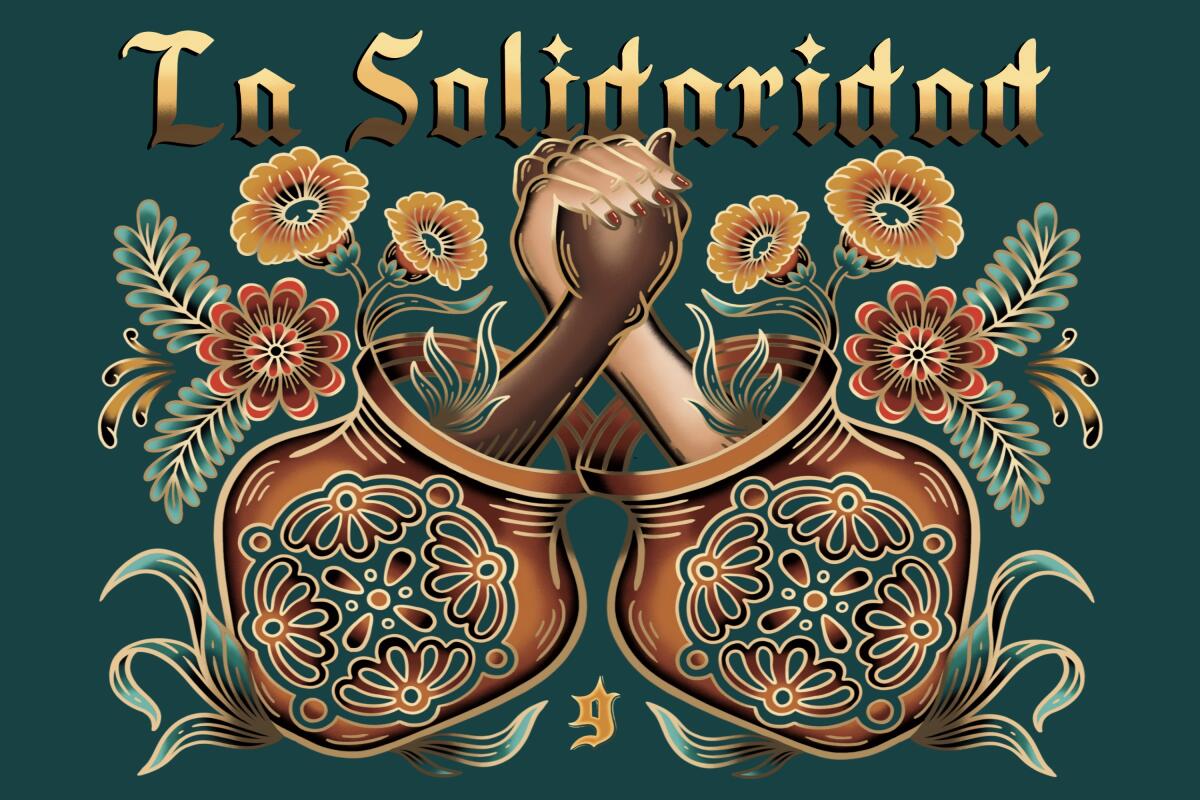Latinx Files: The helplessness of watching the tragedy in Querétaro

- Share via
I haven’t been able to stop thinking about it.
I haven’t been able to shake the deeply disturbing events that took place at Estadio La Corregidora in Querétaro, Mexico, on Saturday afternoon.
It’s not so much the brutality and lack of humanity displayed in the images that popped up on social media, photos and videos so grotesque a friend aptly compared them to the type of content found on narco blogs or notas rojas.
In hindsight, I wish I hadn’t seen images of unconscious men lying naked in pools of their own blood, all because they were wearing the wrong jersey.
Rather, the obsession is rooted in trying to understand what the hell happened. This was not the first Liga MX riot, but it certainly was the worst. Why did the police and security not do anything? Did people die? What was the motive?
I called my dad, the person solely responsible for me being a soccer fan. He didn’t answer. I’d forgotten it was the birthday party for my brother’s triplets, and he was too busy being a good grandfather halfway across the country.
Not knowing what to do, I did what any morbidly curious and confused person does: I turned to Reddit. I read every post on the Liga MX subreddit in hopes of piecing together enough fragments to form something akin to the truth. I was that meme of a strung-out Charlie from “It’s Always Sunny in Philadelphia” ranting about Pepe Silvia.
That paranoia and confusion only magnified after authorities put out a statement saying that a lot of people had been injured, some critically, but there had been no fatalities.
“Nos quieren ver la cara de pendejos,” my dad said when I finally got hold of him the following day.
We spoke about how what they told us didn’t square with what our eyes had seen. That it couldn’t be possible that one single person hadn’t lost their life in the carnage. That it felt premeditated and that the cops had been in on the plan. It felt as though the authorities were trying to cover something up, and that those responsible were going to get away with it. That Liga MX would try to sweep Querétaro under the rug and move on as usual.
As our conversation waned, he told me he felt ashamed. I asked him if he was saying that as a soccer fan or as a Mexican. Both, he said.
We hung up before I could tell him that he shouldn’t feel that way. That the actions of a few idiots had no bearing on our character simply because we shared the same ethnicity. Instead, my own feeling of helplessness got in the way.
The Latinx experience chronicled
Get the Latinx Files newsletter for stories that capture the multitudes within our communities.
You may occasionally receive promotional content from the Los Angeles Times.
When we spoke again on Tuesday afternoon, his shame had given way to anger and cynicism.
“Es puro negocio,” he said of the weak punishment the owners of the other Liga MX clubs doled out to Querétaro FC and its front office. Rather than making an example of them with a lifetime ban, the offending club got off with a slap on the wrist because too much money would be lost.
It’s hard to blame him for feeling that way. There’s too much money to be made from Mexicans watching soccer on both sides of the border for the status quo to change in any meaningful way.
Just ask Eva Longoria and her celebrity pals, who recently bought a stake in lowly Necaxa. They even had an NFT in the works!
Or you can ask TelevisaUnivision. The company owns the sports network TUDN, which broadcasts the most popular soccer league in the United States (it’s not even close). TelevisaUnivision has already made it clear that soccer will be a huge part of Vix, their new Spanish-language streaming service that will supposedly take on Netflix.
Or better yet, why not ask Major League Soccer? The domestic league has been busy forging bonds with its Mexican counterpart — so much so that the word “merger” has been thrown around. It also struck (black and) gold when Los Angeles Football Club signed striker Carlos Vela (the sole reason I started rooting for the team) five years ago, and again later when the L.A. Galaxy signed Javier “Chicharito” Hernandez. The Houston Dynamo acquired Hector Herrera just last week in hopes that the former Atletico Madrid midfielder would stop the franchise from being perpetual table dwellers, while also drawing more of Houston’s massive Mexican/Mexican American population to the matches.
It’s just business, indeed.
It never feels good to be reminded so blatantly that one of the principal functions of professional sports is to extract as much money as possible from loyal fans.
And it sucks seeing a tragedy be used as an excuse to spew hatred against your people. On Saturday, the term “Mexicans” was trending on Twitter, which is never a good thing. The vitriol was so bad that Hérculez Gómez, a former player for the U.S. national team who spent part of his career in Mexico, addressed it on his show “Fútbol Americas.”
“It’s getting xenophobic,” said Gómez, a Mexican American.
I didn’t tell my dad what people were spewing on Twitter, that they were finally saying the quiet part out loud. I figured I didn’t have to. After all, he’s lived in this country for close to 40 years. I’m sure he’s heard it before.
It was once again time to wrap it up, so I asked him what had been on my mind.
Though Liga MX had suspended the remaining Week 9 matches, league play would resume once again this weekend. Not just that, arguably the biggest match of the season was happening this Saturday.
“Are you going to watch America-Chivas?” I asked, genuinely wondering if what had transpired over the weekend had been the last straw for him.
“Yeah. ¿De qué otra me queda?” he replied. There was that helplessness again.
He didn’t ask me if I was going to do the same. My best guess is that he wanted to avoid feeling judged in case I said no.
Instead, he gave me an out. Sensing that I didn’t have an answer for him anyway, he told me he loved me and said goodbye.
Consider subscribing to the Los Angeles Times
Your support helps us deliver the news that matters most. Become a subscriber.
Things we read that we think you should read
— The homies Wiso Vazquez and Jon Arnold wrote thoughtful and reflective takes on the Querétaro riots. You can find them on FutMexNation and Substack, respectively.
— Last week, I finally got around to listening to “Reveal’s” three-episode series on the aftermath of Ayotzinapa. More than seven years later, after a government investigation that did more to cover up the truth than to expose it, we still don’t know what happened to the 43 disappeared students. You can find those episodes here.
— Metro reporters Brittny Mejia and Kevin Rector break down the events that took place during the 12 hours between the Los Angeles Police Department getting a tip about illegal fireworks to them blowing up a South L.A. neighborhood.
— For The Times, Jennifer Swan profiled Angela Romero, a concert promoter behind a hip new bar inspired by lowriders opening soon in Little Tokyo.
— Here’s a good palate cleanser: Do yourself a favor and call (707) 998-8410. Para español, oprima “5.”
And now, for something a little different...

Erik Gomez is a Mexican-born, Texas-raised illustrator and designer. “My art is heavily inspired by the communities I’ve grown with, as a Mexican immigrant artist. My goal is to connect with members of my community through art.”
“I envision solidarity as a lush garden where all plants prosper. My intention is to illustrate a symbol for the strength minorities are capable of when we come together. We are tied by the dirt and oppression we share, but together we grow stronger.”
Erik Gomez es un artista nacido en México y criado en Tejas. “La inspiración de mi arte son las comunidades en que yo crecí, como un artista Mexicano. Mi meta es conectar con la gente usando mi arte.”
“La Solidaridad es como un jardín en donde todas las plantas crecen. Mi intención fue dibujar un símbolo que represente la fuerza que las minoridades son capaces con ambos apoyos. Compartimos la misma tierra y opresión, pero juntos crecemos más fuertes.”
Are you a Latinx artist? We want your help telling our stories. Send us your pitches for illustrations, comics, GIFs and more! Email our art director at martina.ibanezbaldor@latimes.com.
The Latinx experience chronicled
Get the Latinx Files newsletter for stories that capture the multitudes within our communities.
You may occasionally receive promotional content from the Los Angeles Times.




